|
|
|
 The 1970-71 Milwaukee Bucks won the Best of 1970s replay, beating the 1971-72 Los Angeles Lakers, four games to three. The Lakers, with home court, led the series 3-2, but lost Game 6 at Milwaukee, then lost Game 7 on their home floor by a 102-92 score. The combination of center Lew Alcindor (later name changed to Kareem Abdul Jabbar) and guard Oscar Robertson was outstanding for the champion Bucks. Lakers center Wilt Chamberlain defended Alcindor well, and guards Jerry West and Gail Goodrich led the Lakers offense.
The 1970-71 Milwaukee Bucks won the Best of 1970s replay, beating the 1971-72 Los Angeles Lakers, four games to three. The Lakers, with home court, led the series 3-2, but lost Game 6 at Milwaukee, then lost Game 7 on their home floor by a 102-92 score. The combination of center Lew Alcindor (later name changed to Kareem Abdul Jabbar) and guard Oscar Robertson was outstanding for the champion Bucks. Lakers center Wilt Chamberlain defended Alcindor well, and guards Jerry West and Gail Goodrich led the Lakers offense.
With home court, the Lakers take Game 1 by a 121-111 score, as Gail Goodrich leads the team with 25 points, while Jim McMillian adds 23. Oscar Robertson is outstanding in the loss for Milwaukee, scoring 30 points with ten assists for the Bucks. Milwaukee bounces back with a big 121-104 win in Game 2, as Lew Alcindor scores 41 and collects 15 rebounds after a bad first game. Oscar Robertson adds 12 points and 13 assists in the win, while Happy Hairston plays best for the Lakers, with 15 points and 16 rebounds.
After earning a split on the road, the Bucks come home and appear to take control of the series with a 103-88 win in Game 3. Robertson and Alcindor each score 28 points in the win, while Jerry West plays best for the Lakers with 22 points and 12 assists. The Lakers are desperate for a win in Game 4, and blow out Milwaukee in a 108-90 victory. Jerry West scores 21, Gail Goodrich adds 19 and Chamberlain collects 16 rebounds, again out-playing Alcindor. Oscar Robertson leads the Bucks with 18 points and eight assists.
Returning home, the Lakers appear to take control of the series with a clutch 112-110 victory, as Jim McMillian comes up big in the final minutes, and leads the team with 41 points. Jon McGlocklin leads the Bucks with 23 points. Milwaukee heads home for Game 6 and wins easily, 114-89. Lew Alcindor scores 25 and Oscar Robertson scores 17 with nine assists as the Bucks take control of the game early and don't look back. Gail Goodrich leads the Lakers with 26 points. This sets the stage for a seventh game in Los Angeles.
Unfortunately for the Lakers, this one is over pretty early. The Bucks race to a 54-40 halftime lead, then withstand any attempts from Los Angeles to comeback, winning by a 102-92 score. Bob Dandridge and Alcindor each score 20 for the Bucks, while Goodrich leads the Lakers with 19 points.
Game 7: '71 Bucks 102; '72 Lakers 92
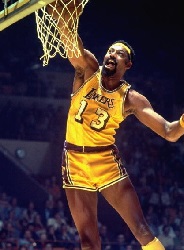 The Milwaukee Bucks finished 62-20, winning the Central Division, and earning the top seed in the Eastern Conference. The Boston Celtics finished 51-31, one game ahead of the New York Knicks and just enough to win the Atlantic Division. The loaded Atlantic Division also saw the Washington Bullets (47-35) and Philadelphia 76ers (46-36) both finish above .500, while the New Jersey Nets pulled up the rear at just 16-66. The Chicago Bulls were a distant second in the Central at 43-39, while the Atlanta Hawks (40-42) and Detroit Pistons (33-49) also qualified for the playoffs. The Cleveland Cavaliers (31-51) and Indiana Pacers (26-56) missed the playoffs.
The Milwaukee Bucks finished 62-20, winning the Central Division, and earning the top seed in the Eastern Conference. The Boston Celtics finished 51-31, one game ahead of the New York Knicks and just enough to win the Atlantic Division. The loaded Atlantic Division also saw the Washington Bullets (47-35) and Philadelphia 76ers (46-36) both finish above .500, while the New Jersey Nets pulled up the rear at just 16-66. The Chicago Bulls were a distant second in the Central at 43-39, while the Atlanta Hawks (40-42) and Detroit Pistons (33-49) also qualified for the playoffs. The Cleveland Cavaliers (31-51) and Indiana Pacers (26-56) missed the playoffs.
In the East playoffs first round, Milwaukee sweeps Detroit and Boston sweeps Atlanta. Washington gets by Philadelphia in four games, while the New York Knicks rally from a 2-1 deficit, winning Game 4 at Chicago, then Game 5 back at home to advance to the second round. In the second round, both series go a full seven games. The Knicks beat Boston on the road in Game 7, while the Bucks rally from a 3-1 hole against Washington, winning the last three games to advance to the East Finals. After a great second round, the Bucks waste no time destroying New York in the East Finals, winning in a 4-0 sweep to advance to The Finals.
Game 4: '71 Bucks 120; '70 Knicks 106
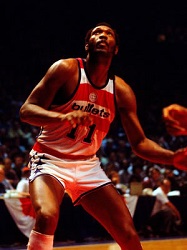 The Los Angeles Lakers finished a league-best 65-17, winning the Pacific Division, and earning top seed in the West playoffs. The Midwest Division was an adventure, with no great teams and a wild back-and-forth battle for the division title. The San Antonio Spurs finished with a rush, winning the division at 43-39, edging the Kansas City Kings (41-41) and the Houston Rockets (40-42). With the Pacific Division so much stronger, I gave the Midwest Division winner only a guarantee of a #4 seed instead of the usual top two seeding for a division winner. The Denver Nuggets (34-48) and New Orleans Jazz (26-56) brought up the rear in the Midwest.
The Los Angeles Lakers finished a league-best 65-17, winning the Pacific Division, and earning top seed in the West playoffs. The Midwest Division was an adventure, with no great teams and a wild back-and-forth battle for the division title. The San Antonio Spurs finished with a rush, winning the division at 43-39, edging the Kansas City Kings (41-41) and the Houston Rockets (40-42). With the Pacific Division so much stronger, I gave the Midwest Division winner only a guarantee of a #4 seed instead of the usual top two seeding for a division winner. The Denver Nuggets (34-48) and New Orleans Jazz (26-56) brought up the rear in the Midwest.
The Portland Trail Blazers finished second to the Lakers at 52-30, with the Golden State Warriors next in line at 47-35. At the bottom fighting for the final playoff spots were the Phoenix Suns (38-44), Buffalo Braves (37-45 - moved west to balance the conferences and thier eventual ties to the San Diego and Los Angeles Clippers) and Seattle Sonics (34-48).
In the West playoffs first round, San Antonio rallies from a 2-1 deficit to eliminate the Kansas City Kings. Portland defeats Phoenix in four games, the Lakers defeat the one-man-team of Bob McAdoo and the Braves in four games, and in an upset, the Rockets defeat the Warriors in four games. In the second round, the favored Blazers take a 3-2 lead over Houston, but drop the last two games as the surprising Rockets advance again. The Lakers also struggle, but beat San Antonio in six games. In the Western Conference Finals, Houston stays hot, stealing a game in Los Angeles, but the Lakers rally to take a 3-2 lead. Houston wins Game 6 at home, but their luck runs out falling in Game 7 on the road.
Game 7: '72 Lakers 122; '77 Rockets 104
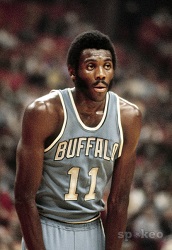 The Best of 1970s NBA league was a 22 team league, modeled largely after the format of the NBA for most of that decade. 11 teams are in the Eastern Conference (Atlantic and Central Divisions) and 11 teams are in the Western Conference (Midwest and Pacific Divisions). Like the 1980s NBA, the top eight teams from each conference make the playoffs, with division winners guaranteed a top four seed, and the remaining spots going to the teams with the next best records. Teams play a full 82 game schedule. The first round of the playoffs is a best of five, and all following rounds are best of seven. All of my seven game series use the older 2-2-1-1-1 format, as travel is obviously not an issue in a sports sim.
The Best of 1970s NBA league was a 22 team league, modeled largely after the format of the NBA for most of that decade. 11 teams are in the Eastern Conference (Atlantic and Central Divisions) and 11 teams are in the Western Conference (Midwest and Pacific Divisions). Like the 1980s NBA, the top eight teams from each conference make the playoffs, with division winners guaranteed a top four seed, and the remaining spots going to the teams with the next best records. Teams play a full 82 game schedule. The first round of the playoffs is a best of five, and all following rounds are best of seven. All of my seven game series use the older 2-2-1-1-1 format, as travel is obviously not an issue in a sports sim.
As with my other replays, the goal is to pick the best team from each franchise within the decade, but in many cases, the choice is difficult. In those situations, I tend to pick the team that I find most appealing for the replay. The 1970s saw no dominant teams and no repeat champions. In several cases, the title winning team wasn't that team's best of the decade - some examples are the Golden State Warriors, who won the title in 74-75, but their 75-76 team was notably better. The same was the case with the Portland Trail Blazers, who won a title in 76-77, but were better on paper in 77-78, doomed by an untimely injury to Bill Walton.
The Washington Bullets won the title in '78, but their '75 team was clearly better on paper. The New York Knicks won two titles in the decade, and I selected their 1969-70 team as it appeared slightly better. The Boston Celtics won two titles in the 1970s in '74 and '76, but their '73 team that went 68-14 but lost in the East Finals was clearly their best on paper, so I selected them. To keep each conference balanced, I moved Bob McAdoo and the Buffalo Braves out to the Pacific Division, since they would eventually become the San Diego/Los Angeles Clippers.
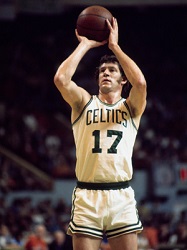 The 1969-70 New York Knicks, coached by Red Holtzman, went 60-22 and won the NBA title, defeating the Lakers in seven games. Guard Walt Frazier and Center Willis Reed were the stars of this team. Frazier averaged 20.9ppg, 8.2apg and 6rpg while Reed, famous for his injury return in The Finals, averaged 21.7ppg and 13.9rpg. Other key players on this team included Dick Barnett (14.9ppg), Dave DeBusschere (14.6ppg) and future Senator Bill Bradley (14.5ppg). Other Celtics teams of the 70s won titles, but none was better on paper than the '72-73 team that went 68-14 before being upset by the Knicks in the playoffs. Tommy Heinsohn coached a great team that featured forward John Havlicek (23.8ppg, 7.1rpg, 6.8apg), center Dave Cowens (20.5ppg, 16.2rpg) and point guard Jo Jo White (19.7ppg, 6.1apg). Other key contributors included forward Paul Silas (13.3ppg, 13.0rpg), Don Chaney (13.1ppg) and Don Nelson (10.8ppg). This great Celtics team hopes to get the title that eluded them in 1973.
The 1969-70 New York Knicks, coached by Red Holtzman, went 60-22 and won the NBA title, defeating the Lakers in seven games. Guard Walt Frazier and Center Willis Reed were the stars of this team. Frazier averaged 20.9ppg, 8.2apg and 6rpg while Reed, famous for his injury return in The Finals, averaged 21.7ppg and 13.9rpg. Other key players on this team included Dick Barnett (14.9ppg), Dave DeBusschere (14.6ppg) and future Senator Bill Bradley (14.5ppg). Other Celtics teams of the 70s won titles, but none was better on paper than the '72-73 team that went 68-14 before being upset by the Knicks in the playoffs. Tommy Heinsohn coached a great team that featured forward John Havlicek (23.8ppg, 7.1rpg, 6.8apg), center Dave Cowens (20.5ppg, 16.2rpg) and point guard Jo Jo White (19.7ppg, 6.1apg). Other key contributors included forward Paul Silas (13.3ppg, 13.0rpg), Don Chaney (13.1ppg) and Don Nelson (10.8ppg). This great Celtics team hopes to get the title that eluded them in 1973.
The Washington Bullets are another team who won a title in the 1970s, but not with their best team. I selected the '74-75 team that went 60-22 (coached by K.c. Jones) but was swept in The Finals by Golden State. One of the great frontcourts of all time was the pair of center Elvin Hayes (23.0ppg, 12.2rpg) and forward Wes Unseld (9.2ppg, 14.8rpg). Guard Phil Chenier led the backcourt with 21.1ppg, while other contributions came from players like Mike Riordan (15.4ppg) and point guard Kevin Porter (11.6ppg, 8.0apg). For the Philadelphia 76ers, I selected the 1977-78 squad that went 55-27 coached by Gene Shue. They lost in the Eastern Conference Finals, but were a formidable team led by Julius Erving (20.6ppg, 6.5rpg), George McGinnis (20.3ppg, 10.4rpg) and Doug Collins (19.7ppg). Other players of note included World B. Free (15.7ppg), Darryl Dawkins (11.7ppg, 7.9rpg) and Henry Bibby (9.1ppg, 5.7apg). Lastly, the New Jersey Nets best squad of the decade was the 1978-79 team (great ABA teams were not included). This team went just 37-45, coached by Kevin Loughery. While they're a lock to finish among the worst teams in this league, players like John Williamson (22.2ppg) and Bernard King (21.6ppg, 8.2rpg) ensure they will be entertaining. Other players of note include Eric Money (16.7ppg, 5.3apg), Eddie Jordan (12.4ppg) and shot-blocking center George Johnson (6.6ppg, 7.9rpg).
 The 1978-79 Atlanta Hawks, coached by Hubie Brown, went 46-36. A balanced team was lead by John Drew (22.7ppg, 6.6rpg), but had solid contributors in forward Dan Roundfield (15.3ppg, 10.8rpg, 2.2bpg), forward Eddie Johnson (16.0ppg) and guard Armond Hill (10.2ppg, 5.9apg). Steve Hawes, Tree Rollins, Tom McMillen and Jack Givens provided depth. Dick Motta coached the 1971-72 Chicago Bulls to a 57-25 record, but they were swept by the eventual champion Lakers in the semifinals. Bob Love (25.8ppg, 6.6rpg) and Chet Walker (22.0ppg, 6.1rpg) provided the offense, whole players like Jerry Sloan (16.2ppg, 8.4rpg), Norm Van Lier (12.1ppg, 7.1apg), Bob Weiss (12.1ppg), Tom Boerwinkle (11.2rpg) and Clifford Ray (10.6rpg) provided a strong supporting cast. The 1975-76 Cleveland Cavaliers, coached by Bill Fitch, went 49-33. The team lacked stars, but had solid players in Jim Chones (15.8ppg, 9.0rpg), Campy Russell (15.0ppg) and Jim Brewer (11.5ppg, 10.9rpg). Depth was provided by players such as Jim Cleamons (12.2ppg), Bingo Smith (13.6ppg), Dick Smith (12.6ppg) and Austin Carr (10.1ppg).
The 1978-79 Atlanta Hawks, coached by Hubie Brown, went 46-36. A balanced team was lead by John Drew (22.7ppg, 6.6rpg), but had solid contributors in forward Dan Roundfield (15.3ppg, 10.8rpg, 2.2bpg), forward Eddie Johnson (16.0ppg) and guard Armond Hill (10.2ppg, 5.9apg). Steve Hawes, Tree Rollins, Tom McMillen and Jack Givens provided depth. Dick Motta coached the 1971-72 Chicago Bulls to a 57-25 record, but they were swept by the eventual champion Lakers in the semifinals. Bob Love (25.8ppg, 6.6rpg) and Chet Walker (22.0ppg, 6.1rpg) provided the offense, whole players like Jerry Sloan (16.2ppg, 8.4rpg), Norm Van Lier (12.1ppg, 7.1apg), Bob Weiss (12.1ppg), Tom Boerwinkle (11.2rpg) and Clifford Ray (10.6rpg) provided a strong supporting cast. The 1975-76 Cleveland Cavaliers, coached by Bill Fitch, went 49-33. The team lacked stars, but had solid players in Jim Chones (15.8ppg, 9.0rpg), Campy Russell (15.0ppg) and Jim Brewer (11.5ppg, 10.9rpg). Depth was provided by players such as Jim Cleamons (12.2ppg), Bingo Smith (13.6ppg), Dick Smith (12.6ppg) and Austin Carr (10.1ppg).
The 1973-74 Detroit Pistons went 52-30, coached by Ray Scott, and lost in the Western semifinals. Young center Bob Lanier averaged 22.5ppg, 13.3rpg and three blocks per game while point guard Dave Bing added 18.8ppg and 6.9apg. Beyond those two stars, the rest of the team was very average, with notable players including Curtis Rowe (10.7ppg, 6.3rpg), Don Adams (10.3ppg, 6.1rpg), George Trapp, Stu Lantz, John Mengelt, Chris Ford and Willie Norwood. The Indiana Pacers won three ABA titles in the 1970s, but once in the NBA they struggled, with their 1978-79 team the best with just a 38-44 record coached by Slick Leonard. The team was lacking stars but had several quality players in Johnny Davis (18.3ppg, 5.7apg), Ricky Sobers (17.3ppg, 5.6apg), James Edwards (16.7ppg, 8.5rpg), Alex English (16.0ppg, 8.1rpg), Mike Bantom (14.7ppg, 8.0rpg) and Billy Knight (14.7ppg). The 1970-71 Milwaukee Bucks, one of the great teams of this decade, if not all-time, finished 66-16 and won the NBA title behind young star center Lew Alcindor (later Kareem Abdul-Jabbar). Alcindor averaged 28.4ppg and 14.4rpg (blocks were not officially kept at this time) during this season. The supporting cast was also good, with players like Oscar Robertson (19.4ppg, 8.2rpg and 5.7apg), Bob Dandridge (18.4ppg, 8.0rpg) the most notable. Other players included Jon McGlocklin (15.8ppg), Greg Smith (11.7ppg, 7.2rpg) and Bob Boozer (9.1ppg). Alcindor would leave the Bucks after just six seasons.
70s All Star Game - East 126; West 120
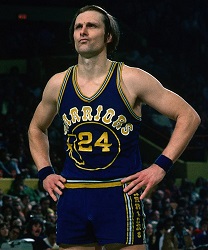 The Denver Nuggets were another team that moved from the ABA to the NBA - their best NBA team of the decade was their first from 1976-77 that went 50-32. Coach Larry Brown had a couple of stars in athletic scorer David Thompson (25.9ppg) and big man Dan Issel (22.3ppg, 8.8rpg). The supporting cast included players like Bobby Jones (15.1ppg, 8.3rpg, 2.3spg), Ted McClain (8.2ppg), Jim Price, Paul Silas and Mack Calvin. The best Houston Rockets team of the decade also came from the 1976-77 season, when Tom Nissalke's squad finished 49-33 before losing in the East Finals to Philadelphia. Forward Rudy Tomjanovich led the way, averaging 21.6ppg and 8.4rpg. Young center Moses Malone was a presence inside, averaging 13.5ppg and 13.4rpg. Other players of note included guards Calvin Murphy (17.9ppg) and John Lucas (11.1ppg,5.6apg), as well as Mike Newlin (12.7ppg), Kevin Kunnert and John Johnson.
The Denver Nuggets were another team that moved from the ABA to the NBA - their best NBA team of the decade was their first from 1976-77 that went 50-32. Coach Larry Brown had a couple of stars in athletic scorer David Thompson (25.9ppg) and big man Dan Issel (22.3ppg, 8.8rpg). The supporting cast included players like Bobby Jones (15.1ppg, 8.3rpg, 2.3spg), Ted McClain (8.2ppg), Jim Price, Paul Silas and Mack Calvin. The best Houston Rockets team of the decade also came from the 1976-77 season, when Tom Nissalke's squad finished 49-33 before losing in the East Finals to Philadelphia. Forward Rudy Tomjanovich led the way, averaging 21.6ppg and 8.4rpg. Young center Moses Malone was a presence inside, averaging 13.5ppg and 13.4rpg. Other players of note included guards Calvin Murphy (17.9ppg) and John Lucas (11.1ppg,5.6apg), as well as Mike Newlin (12.7ppg), Kevin Kunnert and John Johnson.
The Kansas City Kings started the 1970s as the Cincinnati Royals before moving to Kansas City. Their best team of an unremarkable decade was the 1978-79 team coached by Cotton Fitzsimmons that went 48-34 and lost in the West Finals. Guard Otis Birdsong was the top scorer at 21.7 points per game, while other quality players included point guard Phil Ford (15.9ppg, 8.6apg, 2.2spg) and forward Scott Wedman (18.3ppg, 5.3rpg). Inside, the combination of forward Bill Robinzine (13.4ppg, 7.8rpg) and center Sam Lacey (10.6ppg, 8.6rpg) was respectable. Depth was provided by Darnell Hillman, Bob Nash and Billy McKinney. The New Orleans Jazz were an expansion team coming into the 1974-75 season. They only lasted five seasons in New Orleans before moving to Utah, and I felt the '75-76 team was the best, finishing with a 38-44 record coached by Butch Van Breda Kolff. The star of the Jazz in New Orleans was forward Pete Maravich. He missed 20 games this season, but still easily led the team with 25.9 points per game as well as 5.4 assists per game. There was not much after Maravich, with names like Louie Nelson (12.5ppg), Nate Williams (12.8ppg), Ron Behagen (11.5ppg, 8.4rpg) and Otto Moore (9.0ppg, 9.8rpg) rounding out the starters. Depth was provided by Henry Bibby, E.C. Coleman and James McElroy. The Jazz would have better times ahead in Utah. The Spurs began the decade in the ABA as the Dallas Chaparrals. They moved to San Antonio for the '73-74 season and became the Spurs, having three strong seasons before joining the NBA as one of the expansion teams brought in for the '76-77 season. Doug Moe coached the '78-79 Spurs to a 48-34 record, and the Spurs pushed the Washington Bullets to seven games in the East finals before losing. The team had a pair of stars in high-scoring forward George Gervin (29.6ppg, 5.0rpg) and power forward Larry Kenon (22.1ppg, 9.8rpg). Depth was provided by James Silas (16.0ppg), Billy Paultz (11.5ppg, 7.9rpg) and Mark Olberding (9.4ppg, 5.4rpg). The bench was not strong, with only players like Mike Gale, Mike Green, Coby Dietrick and Allan Bristow of much note.
 What are the Buffalo Braves doing out in the Pacific Division? Well, in an attempt to balance the leagues, I needed to move one team out west, and since Buffalo would later become the San Diego Clippers, I opted to move them. The '74-75 Buffalo Braves went 49-33, coached by legendary Jack Ramsay, before losing in the Eastern
conference semis. They were truly a one man team, as forward/center Bob McAdoo (34.5ppg, 14.1rpg) would go on to be the best player in this replay (with the possible exception of Alcindor). There was precious little else after McAdoo. The next best scorer was guard Randy Smith (17.8ppg, 6.5apg), while other players of note included Jim McMillan (14.3ppg, 6.2rpg), Gar Heard (11.1ppg, 9.9rpg) and Jack Marin (11.8ppg). The Golden State Warriors won the NBA title in the '74-75 season, but it was their '75-76 team that was the best of the decade, posting an impressive 59-23 record behind coach Al Attles, before being upset in seven games in the West Finals by Phoenix. Forward Rick Barry was the top scorer, putting in 21.0 points per game, as well as collecting 6.1 assists and 6.1 rebounds per contest. Guard Phil Smith averaged 20.0 points per game while forward Jamaal Wilkes scored 17.8 per game, to go with 9.8 rebounds per game. Other
contributors included center Clifford Ray (6.9ppg, 9.5rpg), Gus Williams (11.7ppg), Charles Johnson (9.2ppg) and center George Johnson (4.9ppg, 7.6rpg). One of the great teams of the 1970s, if not all-time, is the '71-72 Los Angeles Lakers. After years of coming close to a title, '71-72 was when they finally reached the mountain top. Posting a then-best single-season mark of 69-13, the Lakers defeated the Knicks for their first title in Los Angeles. Coach Bill Sharman had a wealth of talent, with guards Jerry West (25.8ppg, 9.7apg) and Gail Goodrich (25.9ppg) providing superior offense. In the middle was the aging but still effective Wilt Chamberlain (14.8ppg, 19.2rpg), surrounded by contributors like forward Happy Hairston (13.1ppg, 13.1rpg) and Jim McMillian (18.8ppg). Elgin Baylor played little due to injury, while Leroy Ellis, Flynn Robinson and future coach Pat Riley played solid minutes off the bench.
What are the Buffalo Braves doing out in the Pacific Division? Well, in an attempt to balance the leagues, I needed to move one team out west, and since Buffalo would later become the San Diego Clippers, I opted to move them. The '74-75 Buffalo Braves went 49-33, coached by legendary Jack Ramsay, before losing in the Eastern
conference semis. They were truly a one man team, as forward/center Bob McAdoo (34.5ppg, 14.1rpg) would go on to be the best player in this replay (with the possible exception of Alcindor). There was precious little else after McAdoo. The next best scorer was guard Randy Smith (17.8ppg, 6.5apg), while other players of note included Jim McMillan (14.3ppg, 6.2rpg), Gar Heard (11.1ppg, 9.9rpg) and Jack Marin (11.8ppg). The Golden State Warriors won the NBA title in the '74-75 season, but it was their '75-76 team that was the best of the decade, posting an impressive 59-23 record behind coach Al Attles, before being upset in seven games in the West Finals by Phoenix. Forward Rick Barry was the top scorer, putting in 21.0 points per game, as well as collecting 6.1 assists and 6.1 rebounds per contest. Guard Phil Smith averaged 20.0 points per game while forward Jamaal Wilkes scored 17.8 per game, to go with 9.8 rebounds per game. Other
contributors included center Clifford Ray (6.9ppg, 9.5rpg), Gus Williams (11.7ppg), Charles Johnson (9.2ppg) and center George Johnson (4.9ppg, 7.6rpg). One of the great teams of the 1970s, if not all-time, is the '71-72 Los Angeles Lakers. After years of coming close to a title, '71-72 was when they finally reached the mountain top. Posting a then-best single-season mark of 69-13, the Lakers defeated the Knicks for their first title in Los Angeles. Coach Bill Sharman had a wealth of talent, with guards Jerry West (25.8ppg, 9.7apg) and Gail Goodrich (25.9ppg) providing superior offense. In the middle was the aging but still effective Wilt Chamberlain (14.8ppg, 19.2rpg), surrounded by contributors like forward Happy Hairston (13.1ppg, 13.1rpg) and Jim McMillian (18.8ppg). Elgin Baylor played little due to injury, while Leroy Ellis, Flynn Robinson and future coach Pat Riley played solid minutes off the bench.
The 1975-76 Phoenix Suns lost in the NBA Finals, but they were just a 42-40 team during the regular season. The 1978-79 team went 52-30 coached by John MacLeod and was the team I chose for this season. Guards Paul Westphal (24.0ppg, 6.5apg) and Walter Davis (23.6ppg, 4.3apg) provided considerable offense, while the frontcourt included center Alvin Adams (17.8ppg, 9.2rpg) and forward Truck Robinson (16.0ppg, 8.7rpg). Other contributors were Don Buse (7.8ppg, 4.3apg), Ron Lee, Alvin Scott and Gar Heard. Led by young center Bill Walton, the Portland Trail Blazers won the NBA title in spring of 1977, but their 1977-78 team was statistically better, even if doomed by Walton's poorly-timed injury. The '77-78 Blazers, coached by Jack Ramsay, went 58-24 (50-11 prior to Walton's injury), but lost in the West Semis to Seattle. Walton averaged 18.9ppg, 13.2rpg and 5.0apg in the season. Maurice Lucas joined Walton on a solid front line, averaging 16.4ppg and 9.1rpg. Lionel Hollins was the best in the back court, scoring 15.9ppg to go with 4.7apg. Other key players included Bob Gross (12.7ppg, 5.6rpg), Johnny Davis (10.7ppg), Tom Owens (10.1ppg, 6.6rpg), Dave Twardzik and Lloyd Neal. Those same Sonics that knocked off Portland lost in the '78 Finals to Washington. They bounced back even better in '78-79, posting a 52-30 mark behind coach Lenny Wilkens, and defeated the Bullets in a Finals rematch. A solid team without a real superstar, the Sonics notable players included Gus Williams (19.2ppg, 4.0apg), Dennis Johnson (15.9ppg, 4.7rpg) and Fred Brown (14.0ppg) in the back court, John Johnson (11.0ppg, 5.5rpg), Lonnie Shelton (13.5ppg, 6.2rpg) at the forwards, and Jack Sikma (15.6ppg, 12.4rpg) and Tom LaGarde (11.0ppg, 8.3rpg) at center.
See the complete daily posts on the Action! PC message board